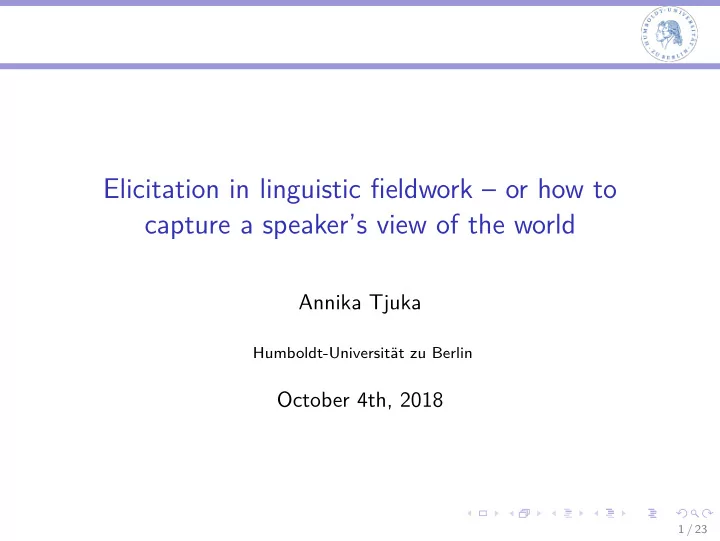

Elicitation in linguistic fieldwork – or how to capture a speaker’s view of the world Annika Tjuka Humboldt-Universität zu Berlin October 4th, 2018 1 / 23
Overview Linguistic fieldwork Elicitation Materials Data processing Study of the Vietnamese tense system Conclusion 2 / 23
Linguistic fieldwork Linguistic fieldwork 3 / 23
Linguistic fieldwork Linguistic fieldwork What would a linguist do? ◮ go to a remote island and document an unknown language ◮ meet with an informant in an office and collect data of her native language 4 / 23
Linguistic fieldwork Linguistic fieldwork in Berlin Figure: Map of the languages I investigate in my Master’s thesis. 5 / 23
Elicitation Elicitation 6 / 23
Elicitation Elicitation ◮ not just a simple translation task ◮ generate natural, not frequent contexts ◮ collect data of targeted linguistic structures 7 / 23
Elicitation Elicitation Materials Elicitation Materials 8 / 23
Elicitation Elicitation Materials Elicitation material - MelaTAMP project Figure: Story board "Tomato and Pumpkin" (von Prince 2018). 9 / 23
Elicitation Elicitation Materials Elicitation material - Master’s thesis Figure: Sketches of the metaphors "Stecknadelkopf" and "the foot of the mountain". 10 / 23
Elicitation Elicitation Materials Elicitation material - Study of the Vietnamese tense system Sarah and Joe are looking through a photo album. Sarah sees a photo of Joe standing infront of the Statue of Liberty. Sarah asks Joe: „Did you go to New York last year?“Joe answers: „ Yes, I went to New York last year. “ 11 / 23
Elicitation Data processing Data processing 12 / 23
Elicitation Data processing Data processing ◮ annotating the audio files in ELAN ◮ tagging the data to make it searchable ◮ making the data available in e.g. ANNIS 13 / 23
Study of the Vietnamese tense system Study of the Vietnamese tense system 14 / 23
Study of the Vietnamese tense system Tense and aspect in Vietnamese Vietnamese is known to be a tenseless language. BUT there are tense and aspect markers in Vietnamese: ◮ s˜ e (future marker) ◮ đã (past marker) ◮ đang (progressive marker) 15 / 23
Study of the Vietnamese tense system Research questions ◮ Do Vietnamese native speakers use tense and aspect markers in spoken conversations? ◮ And if so, are these markers optional or obligatory in contexts which differ in terms of time reference and aspect? 16 / 23
Study of the Vietnamese tense system Participants ◮ 3 male participants, all Vietnamese native speakers with English as their second language (after the age of 6) ◮ Age: 18-25 years ◮ One speaker of the northern dialect and two speakers of the southern dialect 17 / 23
Study of the Vietnamese tense system Elicitation study – Results Figure: Results of elicitation study 18 / 23
Study of the Vietnamese tense system Results ◮ optionality of tense and aspect markers in Vietnamese differs clearly between markers ◮ further research on the future marker s˜ e could prove that it is obligatory –> supporting the hypothesis that Vietnamese isn’t a tenseless language after all 19 / 23
Conclusion Conclusion 20 / 23
Conclusion Conclusion ◮ for linguistic fieldwork you don’t necessarily have to go to far places ◮ elicitation helps us to investigate a certain linguistic phenomenon ◮ it is important to work in an ethical manner with respect to the language, the community, and the profession (Bowern 2008) ◮ in working with different languages we get a clearer picture how humans can view the world 21 / 23
References References ◮ Bowern, Claire (2008): Linguistic fieldwork: A practical guide. Basingstoke, UK: Palgrave Macmillan. ◮ Tjuka, Annika (tbd.): Body part metaphors as a window to cognition: A cross-linguistic study of object and landscape terms. unpublished. ◮ von Prince, Kilu (2018): Tomato and Pumpkin (MelaTAMP storyboards). doi: https://doi.org/10.5281/zenodo.1231836 22 / 23
References Pictures ◮ https://de.wikipedia.org/wiki/Datei:Weltkarte.jpg ◮ https://commons.wikimedia.org/wiki/File:Multimodal_ Annotation_-_Example_with_Grenelle_Corpus.png ◮ https://wikis.hu-berlin.de/melatamp/Tagset ◮ http://corpus-tools.org/annis/ 23 / 23
Recommend
More recommend